By Maxmilian Wechsler
There are some major, paradigm-changing events in life you never forget, and even remember exactly where you were and what you were doing when you heard the news. For most Thais and longtime expats in the country, the official announcement on the evening of October 13, 2016 that His Majesty King Bhumibol Adulyadej had passed away is one of these moments. All across Thailand, ordinary daily activities came to a halt as people crowded around television sets that broadcasted the sad news on all local as well as foreign channels.
After a while Prime Minister General Prayuth Chan-o-cha addressed the nation in a speech which said in part: “Throughout His Majesty’s reign, our nation was developed in all areas and His Majesty was loved and deeply revered by all Thai people. “For 70 years His Majesty reigned with righteousness for the benefit and happiness of the Siamese people. Now, the 70-year reign of His Majesty King Bhumibol the Great has ended. As the benevolence of His Majesty the King for the Thai people has been immeasurable, our profound sorrow and bereavement on this loss shall also be immeasurable.
| “Dear Thai people, His Majesty King Bhumibol Adulyadej, Rama IX, has passed away. Long live His Majesty the new King,” the prime minister said in concluding his speech. Messages of condolence from presidents, monarchs, prime ministers and heads of international organisations poured in from all corners of the world. In Thailand, fashion themes were immediately reduced to black. Memorial tributes with large portraits of His Majesty sprang up at shopping malls, government buildings, hotels, hospitals and even along roadsides. At countless locations people waited solemnly and patiently in long queues to sign condolence books. The sincere public display of grief which still remains one year on would be hard to imagine in any other country. According to figures from the Bureau of the Royal Household reported on September 17 in The Nation newspaper, nearly 10.7 million people had paid their respects before the royal funeral urn of King Bhumibol at Dusit Maha Prasart Throne Hall since October 18, 2016, and public donations toward merit-making ceremonies for the late King total nearly 790.65 million baht as of Friday, September 15. |
King Bhumibol Adulyadej: Thailand’s International Monarch
His Majesty King Bhumibol Adulyadej led a remarkable life filled with achievements of great value and benefit to his subjects. His passing left a vacuum not only in Thailand but also in the international community. It’s not surprising that His Majesty displayed a keen, lifelong understanding of international events and developments. Born in Cambridge, Massachusetts, US, he is the only Thai monarch to have been raised on foreign soil. He spent his formative years in Europe, mainly in Switzerland. His Majesty studied science and then politics before acceding to the throne in 1946. Despite growing up in the West, His Majesty was instilled by the Princess Mother, HRH Princess Srinagarindra, with the values and traditions of the Thai people.
His Majesty’s background was thus a unique convergence of Western and Eastern cultures. This was reflected in his very wide-ranging interests in arts, particularly music, photography and painting; sports such as sailing; and all manner of scientific inventions and innovations. His Majesty King Bhumibol was a true ‘Renaissance Monarch’ in every aspect.
It was His Majesty’s grandfather, King Chulalongkorn the Great, also known as King Rama V, who guided Thailand into the modern era. King Rama V’s foresight and engagement with the world enabled Siam to be the only country in Southeast Asia to escape the wave of foreign colonisation. He achieved this by learning tactics from the West and by travelling to Europe in 1897 in order to make Siam known to the Western monarchs – to showcase them that Siam was a civilized nation and not a land of ‘barbarians.’
Early in his reign, His Majesty King Bhumibol Adulyadej followed in the footsteps of his illustrious forebear. In less than a decade, from 1959 to 1967, His Majesty, accompanied by Her Majesty Queen Sirikit, visited 27 countries. He met with important world leaders, reaffirmed ties forged in Europe during the time of Rama V, addressed the US Congress and placed the small country of Thailand securely on the international map. Apart from merely ‘showing the flag’, the trips were also opportunities for His Majesty to learn the latest skills and practices from developed Western nations, which he would later utilise to benefit the Thai people.
After that period of intense international travel, His Majesty returned to Thailand and never travelled abroad again. When asked why, His Majesty responded that he wanted to understand Thailand better in order to help the Thai people. During the remainder of his Reign, His Majesty travelled to all the remote corners of Thailand, no matter how underdeveloped or difficult to reach. He visited all of Thailand’s provinces and met with local residents from all walks of life – farmers, fishermen, merchants, local administrators – to listen to their views and needs.
His Majesty provided technical advice to government agencies in forming solutions to help the common people, bringing about a synergy between local traditions and modern methods. During his domestic travels, His Majesty was invariably accompanied by Her Majesty Queen Sirikit and other members of the Royal Family. From a young age, members of the Thai Royal Family were instilled with Thai culture and values, and made aware of their responsibilities to the Thai people.
His Majesty consistently maintained that Thailand is inherently an agricultural country and should never abandon its roots. He repeatedly emphasised that Thailand must be able to feed itself. His Majesty therefore attached a great deal of importance in helping agriculture flourish. He applied his knowledge of science, acquired mainly from time spent abroad, to create and support the Royal Development Projects.
The projects were focused on increasing the efficiency and effectiveness of farming methods, using modern techniques such as crop substitution, water management, reversing the effects of soil erosion, along with inventions and innovations such as artificial rainmaking and the Chaipattana Aerator. He also turned his talents to generating renewable energy from palm oil. Many of His Majesty’s applications in this area received patents domestically and abroad. Ultimately, these and other innovations have resulted in a significant improvement in the livelihood and welfare of Thailand’s farmers.
His Majesty was a visionary far beyond his time in terms of his holistic approach to sustainable development. Almost every priority in the Sustainable Development Goals (SDGs) were advocated and practiced by His Majesty decades before the UN SDG list was compiled. His Majesty first outlined his Sufficiency Economy Philosophy in 1974.
| The philosophy encourages people to live within their means and not abuse natural resources, in order to enhance sustainability and create resilience to external challenges. Utilising a bottom-to-top approach, the philosophy’s core principles are quite simple: live a life of moderation, applying reasonableness and self-control. His approach that encourages people to live within their means and not abuse natural resources in order to increase sustainability and create resilience to external challenges. Its core principles giving importance to living a life of moderation and applying discipline and self-control are at the heart of today’s global sustainable development movement. The significance that His Majesty attached to agriculture led to the evolution of Thailand into one of the world’s leading agricultural powerhouses. Now Thailand is not only able to feed itself, it also makes an immense contribution to the maintenance of global food security. Many of His Majesty’s inventions and innovations, such as artificial rainmaking, are increasingly being applied abroad. The remarkable achievements that have created a positive impact on both a local and global scale have earned His Majesty the accolade of “Thailand’s Development King” by the UN. This title is well deserved in light of the incredible legacy King Bhumibol Adulyadej has left behind. Adapted from a statement published on the website of the Royal Thai embassy in Amman, Jordan Thailand mourns the late, great monarch, His Majesty King Bhumibol Adulyadej His Majesty King Bhumibol Adulyadej, was revered and beloved among all of Thailand’s 67 million people. Homes and businesses throughout the Kingdom traditionally displayed His Majesty’s portrait in an honourable, prominent position to illustrate their love for the King who reigned for 70 years (1946-2016). His Majesty King Bhumibol was the ninth King of the Chakri Dynasty and will forever be remembered as the Monarch who worked hardest to improve the lives of all Thai citizens through his comprehensive understanding of their living conditions. This earned His Majesty the well-deserved title of ‘Father of the Nation’. At His Majesty’s coronation ceremony, he made the pledge: “We shall reign with righteousness for the benefit and happiness of the Siamese people”. Throughout his reign, His Majesty proved through his tireless efforts that he truly believed it was the Crown’s duty to serve its subjects. |
Following his accession to the throne, His Majesty King Bhumibol dedicated himself to visiting every part of his Kingdom in order to understand how his subjects lived and the struggles they endured. There was not a single location that the young Monarch considered to be too remote. His Majesty was often seen fording rivers or trekking up mountainsides in order to reach his subjects. He was known to fly by helicopter into areas that were inaccessible to the sturdiest off-road vehicles. Often he was accompanied on these expeditions by Her Majesty Queen Sirikit and their children, and therefore they also display their father’s clear understanding of all levels of Thai society.
Upon learning of the hardships his subjects experienced, His Majesty began researching projects and initiatives that could help alleviate them and help to improve their lives. As a visionary, His Majesty King Bhumibol understood that any attempts to improve the lives of the Thai people could not be temporary. To bring about real benefits to the people, projects were planned for the long term and aimed at sustaining the nation’s natural resources.
Among the more than 4,000 Royal Development Projects (RDPs) that resulted are a number of programmes aimed at improving water management and reversing the effects of soil erosion. One initiative of particular importance was devised as a way to help hill tribe people who had been engaged in unsustainable farming practices. In fact, many of these people were deriving their income from growing opium in northern Thailand’s Chiang Rai province, right in the heart of the notorious Golden Triangle.
In the 1960s, His Majesty encouraged the promotion of crop substitution programmes for the hill tribe people in Chang Rai and other northern provinces. Over the years these programmes have successfully transformed the opium-growing areas into productive agricultural zones producing high-value crops such as strawberry, coffee, macadamia, flowers and various fresh vegetables, and generated a stable income source for tribal and other rural farmers.
The reduction in opium production also played a big role in reducing the drug-addicted population within and outside Thailand. The clearest proof of the projects’ success is that the Golden Triangle, once known as a stronghold of drug mafia, is now a popular tourist region.
One of the main reasons for the success of the RDPs is their management system. His Majesty King Bhumibol did not issue simple orders or make quick decisions on important matters. Rather, the King utilised a detail-oriented approach and brought together a consortium of groups which he personally oversaw. The first step involved researching available data, then combining this with information His Majesty gathered during his interactions with local people. Next, His Majesty consulted with academics and officials to ensure the best possibility of success for each project. Once this stage was completed, the initiative was passed on to the government for implementation.
His Majesty King Bhumibol felt that the people would be better served if centres were created where research could be carried out to implement projects in a way that was most beneficial for each particular region. The idea was to take into consideration the big variety of climates and ecological conditions found throughout the nation. With this in mind, Royal Development Study Centers (RDSCs) were opened covering the country’s major regions, from Chiang Mai and Chiang Rai in the north down to the southern province of Narathiwat.
Each centre works closely with academics, the government and local communities on ways to apply research and modern agricultural techniques in order to create sustainability and protect the environment. A unique feature of the centres is that they do nothing to alter the land or disrupt local culture, but work hand-in-hand with the local people and resources available in each area.
There is no doubt that the RDPs and RDSCs have greatly enhanced the quality of life for people living in Thailand’s rural areas. However, His Majesty’s most significant achievement may be the creation of the Sufficiency Economy Philosophy, which was introduced in 1974 and is the guiding principle behind the RDPs. The RDSCs have served as test beds for various applications of the philosophy.
Over the course of more than 40 years, the Sufficiency Economy Philosophy has become ingrained among Thai citizens, regardless of their gender, age or economic status. It has become part of their daily lives, particular following the hard lessons learned from the 1997 economic crisis. It has even become a key element of the business practices of large Thai corporations.
The philosophy has not only taken hold throughout the Kingdom, but has also been adapted and applied in other countries, including the Democratic Republic of Timor-Leste, the Lao People’s Democratic Republic and the Kingdom of Lesotho. Thailand continues to share positive experiences in implementing the philosophy with the international community, for example the G77 group of countries.
His Majesty’s life-long devotion to advancing and refining Thailand’s agricultural sector and promoting sustainability have resulted in a significant improvement in the welfare of the Thai people and provided a beacon of inspiration for the rest of the world.
Adapted from a statement published on the website of the Royal Thai embassy in Vienna, Austria
Commemorating a life of achievements
His Majesty King Bhumibol Adulyadej is widely considered to have been the world’s hardest working monarch. In recognition of this he was awarded an astonishing number of medals and awards from international organisations. A full list of these follows:
• Special Medal of the European Parliament presented by the European Parliament, Brussels, Belgium, on July 19, 1975.
• IAUP Peace Award, in recognition of the King’s dedication to higher education and the promotion of peace in Southeast Asia, presented by the International Association of University Presidents (IAUP), Seoul, Republic of Korea, on September 8, 1986.
• Gold Medal Award for His Majesty’s outstanding leadership in rural development presented by the Asian Institute of Technology, Pathum Thani, Thailand, on July 21, 1987.
• William J. Donovan Medal, Award of Friendship by veterans of the Office of Strategic Services and the William J. Donovan Memorial Foundation, presented by the Office of Strategic Services, New York, USA, on October 29, 1987.
• Gold Medal to commemorate the occasion of the Joint Academic Meeting between the Royal College of Surgeons of Thailand and the Royal College of Surgeons of England, presented by the Royal College of Surgeons of England, London, United Kingdom, on October 3, 1989.
• Rotary International Award of Honor, presented by Rotary International, Illinois, USA, on August 17, 1991.
• UNEP Gold Medal of Distinction, in recognition of long, dedicated, exemplary and eminent contributions to the improvement of environment and nature conservation, presented by the United Nations Environment Programme (UNEP), Nairobi, Kenya, on November 4,1992.
• Philae Medal, in recognition of His Majesty’s devotion to rural development and people’s well-being, presented by the United Nations Education, Scientific and Cultural Organization in Paris, France on December 2, 1991.
• Health-for-All Gold Medal, in recognition of His Majesty’s outstanding contribution to achievement of the social goal of health for all by the year 2000, presented by World Health Organization, Geneva Switzerland, on November 24, 1992.
• Natura Pro Futura Medal, for the conservation of biodiversity, presented by the international Society of Chemical Ecology, Florida, USA, on January 26, 1993.
• International Merit Award, in recognition of His Majesty’s contribution to the use of vetiver for soil conservation and environmental improvement, awarded by the International Erosion Control Association, Colorado, USA, on February 25, 1993.
• Award of recognition of technical and development accomplishment in the promotion of the vetiver technology international, presented by the World Bank, Washington DC, on October 30, 1993.
• Award of Appreciation, in recognition of His Majesty;s outstanding contribution to drug control efforts in Thailand, presented by the United Nations International Drug Control Programme, Vienna, Austria, on December 12, 1994.
• Agricola Medal, in recognition of His Majesty’s devotion to the well-being and happiness of all people in Thailand, particularly those who till the soil, tend the waters and nurture the forests, presented by Food and Agriculture Organization, Rome, Italy, on December 6, 1995.
• International Rice Award Medal in recognition of His Majesty’s passionate and personal interest in, and devotion to, improving the well-being of rice farmers and consumers particularly those with low incomes, presented by the International Rice Research Institute, Laguna, the Philippines, on June 5, 1996.
• Presidential Citation for Humanitarian Services, presented by Rotary International, Illinois, USA, on October 24, 1996.
• Partnership for World Health Award, in recognition of His Majesty’s efforts to promote the prevention and cure of chest diseases in Thailand, presented by the American College of Chest Physicians, Illinois, USA, on November 13, 1996.
• Award of recognition of His Majesty’s strong support for meteorology and operational hydrology, presented by the World Meteorological Organization, Geneva, Switzerland, on February 18, 1997.
• ICCIDD Gold Medal, in recognition of His Majesty’s leadership, guidance and direction to the National IDD Control Project, awarded by the International Council of the Control of Iodine Deficiency Disorder, Ottawa, Canada, on June 25, 1997.
• Plague of Honor in recognition of His Majesty’s literary works, presented by the Organizing Committee of the Southeast Asian Writer Awards, Bangkok, Thailand, on July 8, 1997.
• Gold Medal Award, in recognition of His Majesty’s long, invaluable contributions to global lung health, presented by the International Union Against Tuberculosis and Lung Disease, Paris, France, on November 24, 1998.
• Lions Humanitarian Award, in recognition of His Majesty’s passionate and personal interest, in and devotion to, improving the quality of life and well-being of the Thai people, especially in the areas of health and education, presented by the International Association of Lions Club, Illinois, USA, on March 3,1999.
• TeleFood Medal, in recognition of His Majesty’s dedication to Thailand’s agriculture development, with aim of raising the farmers standard of living and establishing food security, presented by the Food and Agriculture Organization, Rome, Italy, on December 8, 1999.
• Sanford Medal, in recognition of His Majesty’s preserving of the musical culture of Thailand through education and performance, presented by Yale University School of Music, Connecticut, USA, on January 18, 2000.
• Lalaounis Cup, in recognition of His Majesty’s outstanding merit in the course of athleticism and His Majesty’s faithfulness to the Olympic Ideal, Lausanne, Switzerland, on February 19, 2000.
• WHO Plague in recognition of His Majesty’s unstinting and powerful moral leadership and example in public health, presented by the World Health Organization, Geneva, Switzerland, on 31 May, 2000.
• Merite de I’ Invention (The Invention Merit), in recognition of His Majesty’s outstanding services to the course of progress and His Majesty’s assistance to the inventions, presented by the Belgian Chamber of Inventors, Brussels, Belgium, on June 5, 2000.
• Berkeley Medal, in recognition of His Majesty’s remarkable devotion to the people of Thailand and for the great contributions towards the political stability and economic vitality of the country, presented by the University of California, Berkeley, USA, on November 2, 2000.
• World Outstanding Awards (Prix OMPI Gold Medal with Mention, Grand Prix International Cup, Minister J. Chabert Cup, and Yugoslavia Cup) at Eureka 2000; 49th World Exhibition of Innovation, Research and New Technology, presented by the Organization Committee of Brussels, Eureka 2000, Brussels, Belgium, on February16, 2001.
• Golden Shining Symbol of World Leadership, in recognition of His Majesty’s outstanding support for boxing and all sports in Thailand, presented by the World Boxing Council, Mexico City, Mexico, on November 26, 2001.
• World Outstanding Invention Awards (D’ un concept nouveau de development de la Thailand, Special Prix Cup, and three Gold medals with mention), presented by Brussels Eureka 2001, 50th World Exhibition of Innovation, Research and New Technology, Brussels, Belgium, on March 27, 2002.
• UN-HABITAT Scroll of Honor Award (Special Citation) in recognition of his Majesty’s contribution to sustaining habitats and improving the quality of life of the Thai people’s lives, presented by the United Nations Human Settlements Programme (UN-HABITAT), Nairobi, Kenya, on February 25, 2004.
• Golden Ear of Paddy, commemorating the outstanding leadership in Rural Development of His Majesty, presented by the Asia-Pacific Rural and Agricultural Credit Association, Bangkok, Thailand, on May 23, 2005.
• UNDP Human Development Lifetime Achievement Award, in recognition of the global relevance of his call for a sufficiency approach to development, presented by the United Nations Development Programme, New York, USA, on 26 May 2006.
• Bronze Wolf for Outstanding Services to the Scout Movement, presented by the World Organization of the Scout Movement, Geneva, Switzerland, on June 20, 2006.
• TIME Asian Hero King Bhumibol Adulyadej for Shaping the Asia of Our Times, presented by TIME Asia, Hong Kong, on November 29, 2006
• UAE Prize for Weather Modification, presented by the government of the United Arab Emirate and the World Meteorological Organization, Geneva, Switzerland, on May 16, 2007.
• The first Dr Norman E. Borlaug World Food Prize Medallion in recognition of His Majesty’s dedication to the well-being and proper nutrition of the Thai people, presented by World Food Prize Foundation, Des Moines, Iowa, USA, on July 23, 2007.
• IFIA Cup 2007 for His Majesty’s Chaipattana Low Speed Aerator used in wastewater treatment; IFIA Genius Medal for His Majesty’s “New Theory” for farmers and his Sufficiency Economy Philosophy, presented by the International Federation of Inventors Association, Budapest, Hungary, on November 12, 2007.
• KIPA Special Prize with certificate in recognition of His Majesty as Father of Thailand’s Invention, presented by the Korea Invention Promotion Association, Seoul, Republic of Korea, on November 12, 2007.
• SEA Games Federation Merit Award, presented to His Majesty by the Southeast Asia Games Federation, on December 9, 2007.
• WIPO Global Leader Award was presented to His Majesty by the World Intellectual Property Organization, Geneva, Switzerland, on January 14, 2009.
• IUSS Humanitarian Soil Scientist Medal, presented by the International Union of Soil Sciences on April 16, 2012.
• The President’s Medal, presented by the Badminton World Federations, on November 3, 2012.
Source: Publication of the Royal Thai government
His Majesty King Bhumibol Adulyadej is widely considered to have been the world’s hardest working monarch. In recognition of this he was awarded an astonishing number of medals and awards from international organisations. A full list of these follows:
• Special Medal of the European Parliament presented by the European Parliament, Brussels, Belgium, on July 19, 1975.
• IAUP Peace Award, in recognition of the King’s dedication to higher education and the promotion of peace in Southeast Asia, presented by the International Association of University Presidents (IAUP), Seoul, Republic of Korea, on September 8, 1986.
• Gold Medal Award for His Majesty’s outstanding leadership in rural development presented by the Asian Institute of Technology, Pathum Thani, Thailand, on July 21, 1987.
• William J. Donovan Medal, Award of Friendship by veterans of the Office of Strategic Services and the William J. Donovan Memorial Foundation, presented by the Office of Strategic Services, New York, USA, on October 29, 1987.
• Gold Medal to commemorate the occasion of the Joint Academic Meeting between the Royal College of Surgeons of Thailand and the Royal College of Surgeons of England, presented by the Royal College of Surgeons of England, London, United Kingdom, on October 3, 1989.
• Rotary International Award of Honor, presented by Rotary International, Illinois, USA, on August 17, 1991.
• UNEP Gold Medal of Distinction, in recognition of long, dedicated, exemplary and eminent contributions to the improvement of environment and nature conservation, presented by the United Nations Environment Programme (UNEP), Nairobi, Kenya, on November 4,1992.
• Philae Medal, in recognition of His Majesty’s devotion to rural development and people’s well-being, presented by the United Nations Education, Scientific and Cultural Organization in Paris, France on December 2, 1991.
• Health-for-All Gold Medal, in recognition of His Majesty’s outstanding contribution to achievement of the social goal of health for all by the year 2000, presented by World Health Organization, Geneva Switzerland, on November 24, 1992.
• Natura Pro Futura Medal, for the conservation of biodiversity, presented by the international Society of Chemical Ecology, Florida, USA, on January 26, 1993.
• International Merit Award, in recognition of His Majesty’s contribution to the use of vetiver for soil conservation and environmental improvement, awarded by the International Erosion Control Association, Colorado, USA, on February 25, 1993.
• Award of recognition of technical and development accomplishment in the promotion of the vetiver technology international, presented by the World Bank, Washington DC, on October 30, 1993.
• Award of Appreciation, in recognition of His Majesty;s outstanding contribution to drug control efforts in Thailand, presented by the United Nations International Drug Control Programme, Vienna, Austria, on December 12, 1994.
• Agricola Medal, in recognition of His Majesty’s devotion to the well-being and happiness of all people in Thailand, particularly those who till the soil, tend the waters and nurture the forests, presented by Food and Agriculture Organization, Rome, Italy, on December 6, 1995.
• International Rice Award Medal in recognition of His Majesty’s passionate and personal interest in, and devotion to, improving the well-being of rice farmers and consumers particularly those with low incomes, presented by the International Rice Research Institute, Laguna, the Philippines, on June 5, 1996.
• Presidential Citation for Humanitarian Services, presented by Rotary International, Illinois, USA, on October 24, 1996.
• Partnership for World Health Award, in recognition of His Majesty’s efforts to promote the prevention and cure of chest diseases in Thailand, presented by the American College of Chest Physicians, Illinois, USA, on November 13, 1996.
• Award of recognition of His Majesty’s strong support for meteorology and operational hydrology, presented by the World Meteorological Organization, Geneva, Switzerland, on February 18, 1997.
• ICCIDD Gold Medal, in recognition of His Majesty’s leadership, guidance and direction to the National IDD Control Project, awarded by the International Council of the Control of Iodine Deficiency Disorder, Ottawa, Canada, on June 25, 1997.
• Plague of Honor in recognition of His Majesty’s literary works, presented by the Organizing Committee of the Southeast Asian Writer Awards, Bangkok, Thailand, on July 8, 1997.
• Gold Medal Award, in recognition of His Majesty’s long, invaluable contributions to global lung health, presented by the International Union Against Tuberculosis and Lung Disease, Paris, France, on November 24, 1998.
• Lions Humanitarian Award, in recognition of His Majesty’s passionate and personal interest, in and devotion to, improving the quality of life and well-being of the Thai people, especially in the areas of health and education, presented by the International Association of Lions Club, Illinois, USA, on March 3,1999.
• TeleFood Medal, in recognition of His Majesty’s dedication to Thailand’s agriculture development, with aim of raising the farmers standard of living and establishing food security, presented by the Food and Agriculture Organization, Rome, Italy, on December 8, 1999.
• Sanford Medal, in recognition of His Majesty’s preserving of the musical culture of Thailand through education and performance, presented by Yale University School of Music, Connecticut, USA, on January 18, 2000.
• Lalaounis Cup, in recognition of His Majesty’s outstanding merit in the course of athleticism and His Majesty’s faithfulness to the Olympic Ideal, Lausanne, Switzerland, on February 19, 2000.
• WHO Plague in recognition of His Majesty’s unstinting and powerful moral leadership and example in public health, presented by the World Health Organization, Geneva, Switzerland, on 31 May, 2000.
• Merite de I’ Invention (The Invention Merit), in recognition of His Majesty’s outstanding services to the course of progress and His Majesty’s assistance to the inventions, presented by the Belgian Chamber of Inventors, Brussels, Belgium, on June 5, 2000.
• Berkeley Medal, in recognition of His Majesty’s remarkable devotion to the people of Thailand and for the great contributions towards the political stability and economic vitality of the country, presented by the University of California, Berkeley, USA, on November 2, 2000.
• World Outstanding Awards (Prix OMPI Gold Medal with Mention, Grand Prix International Cup, Minister J. Chabert Cup, and Yugoslavia Cup) at Eureka 2000; 49th World Exhibition of Innovation, Research and New Technology, presented by the Organization Committee of Brussels, Eureka 2000, Brussels, Belgium, on February16, 2001.
• Golden Shining Symbol of World Leadership, in recognition of His Majesty’s outstanding support for boxing and all sports in Thailand, presented by the World Boxing Council, Mexico City, Mexico, on November 26, 2001.
• World Outstanding Invention Awards (D’ un concept nouveau de development de la Thailand, Special Prix Cup, and three Gold medals with mention), presented by Brussels Eureka 2001, 50th World Exhibition of Innovation, Research and New Technology, Brussels, Belgium, on March 27, 2002.
• UN-HABITAT Scroll of Honor Award (Special Citation) in recognition of his Majesty’s contribution to sustaining habitats and improving the quality of life of the Thai people’s lives, presented by the United Nations Human Settlements Programme (UN-HABITAT), Nairobi, Kenya, on February 25, 2004.
• Golden Ear of Paddy, commemorating the outstanding leadership in Rural Development of His Majesty, presented by the Asia-Pacific Rural and Agricultural Credit Association, Bangkok, Thailand, on May 23, 2005.
• UNDP Human Development Lifetime Achievement Award, in recognition of the global relevance of his call for a sufficiency approach to development, presented by the United Nations Development Programme, New York, USA, on 26 May 2006.
• Bronze Wolf for Outstanding Services to the Scout Movement, presented by the World Organization of the Scout Movement, Geneva, Switzerland, on June 20, 2006.
• TIME Asian Hero King Bhumibol Adulyadej for Shaping the Asia of Our Times, presented by TIME Asia, Hong Kong, on November 29, 2006
• UAE Prize for Weather Modification, presented by the government of the United Arab Emirate and the World Meteorological Organization, Geneva, Switzerland, on May 16, 2007.
• The first Dr Norman E. Borlaug World Food Prize Medallion in recognition of His Majesty’s dedication to the well-being and proper nutrition of the Thai people, presented by World Food Prize Foundation, Des Moines, Iowa, USA, on July 23, 2007.
• IFIA Cup 2007 for His Majesty’s Chaipattana Low Speed Aerator used in wastewater treatment; IFIA Genius Medal for His Majesty’s “New Theory” for farmers and his Sufficiency Economy Philosophy, presented by the International Federation of Inventors Association, Budapest, Hungary, on November 12, 2007.
• KIPA Special Prize with certificate in recognition of His Majesty as Father of Thailand’s Invention, presented by the Korea Invention Promotion Association, Seoul, Republic of Korea, on November 12, 2007.
• SEA Games Federation Merit Award, presented to His Majesty by the Southeast Asia Games Federation, on December 9, 2007.
• WIPO Global Leader Award was presented to His Majesty by the World Intellectual Property Organization, Geneva, Switzerland, on January 14, 2009.
• IUSS Humanitarian Soil Scientist Medal, presented by the International Union of Soil Sciences on April 16, 2012.
• The President’s Medal, presented by the Badminton World Federations, on November 3, 2012.
Source: Publication of the Royal Thai government

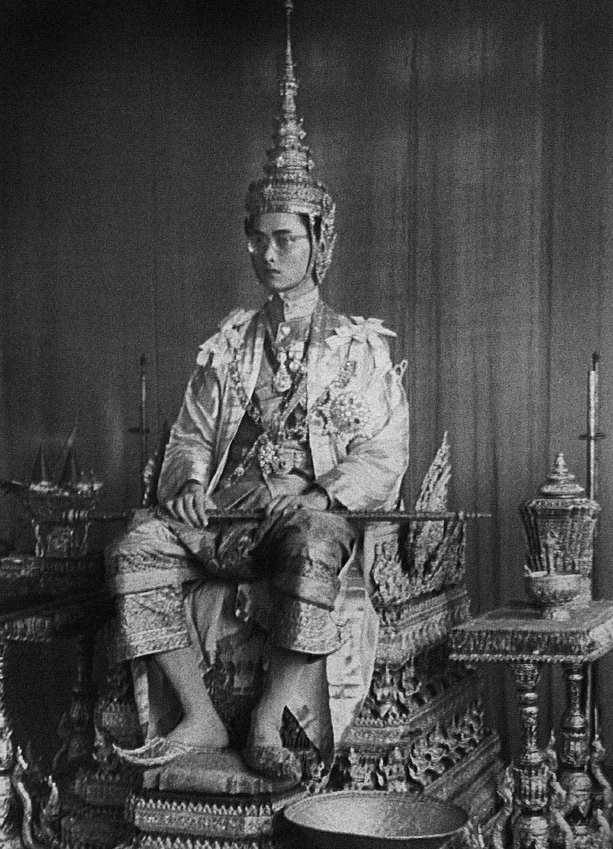
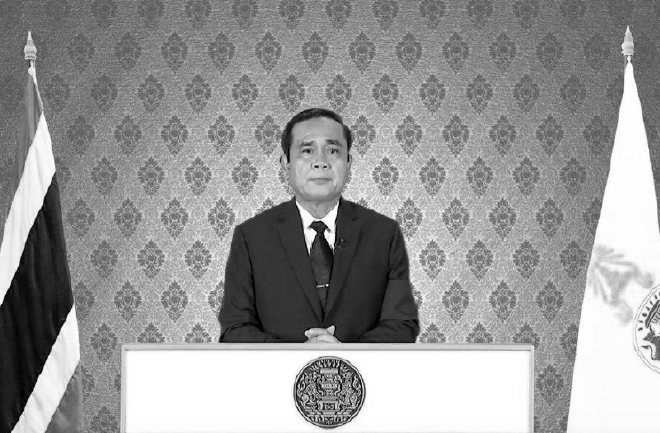
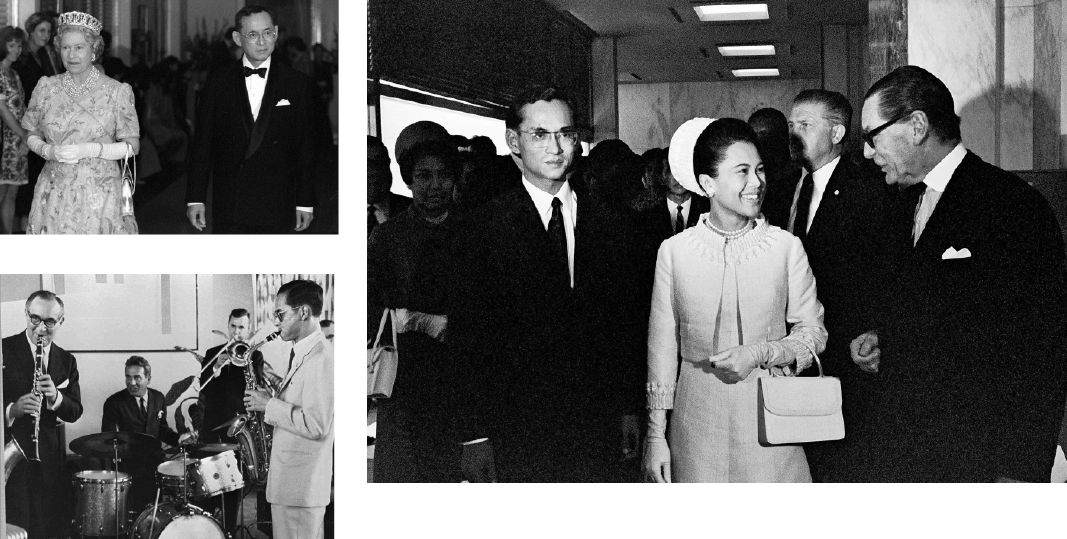
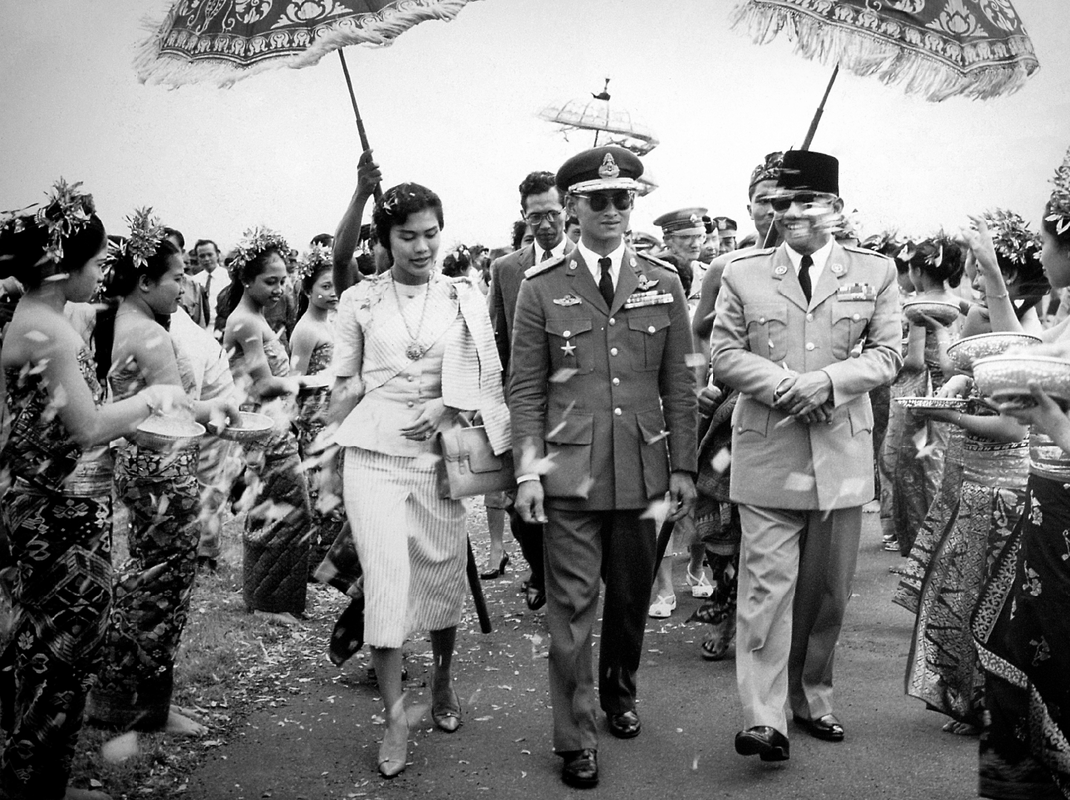
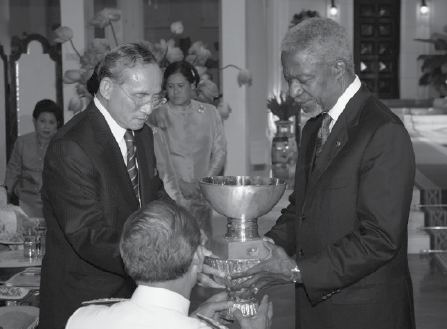
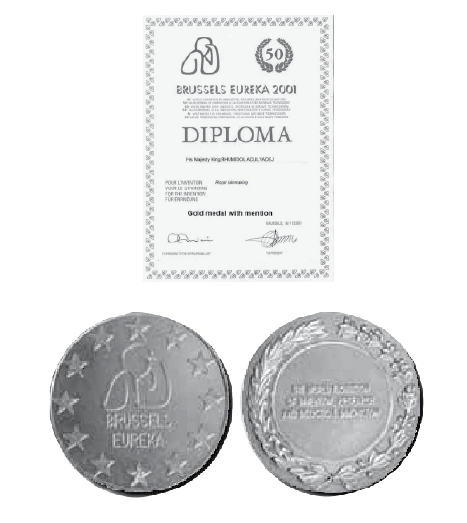
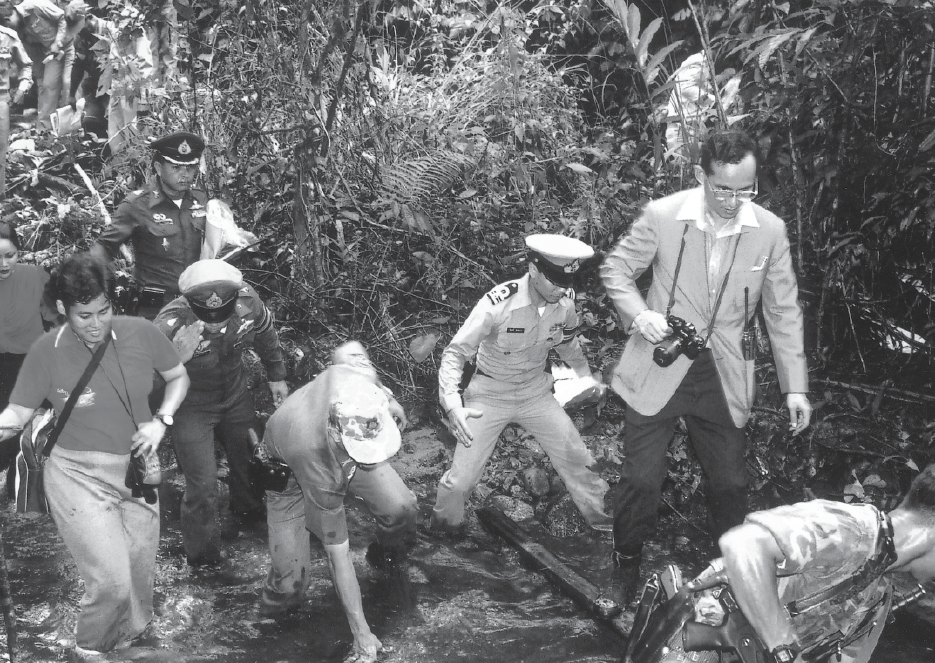
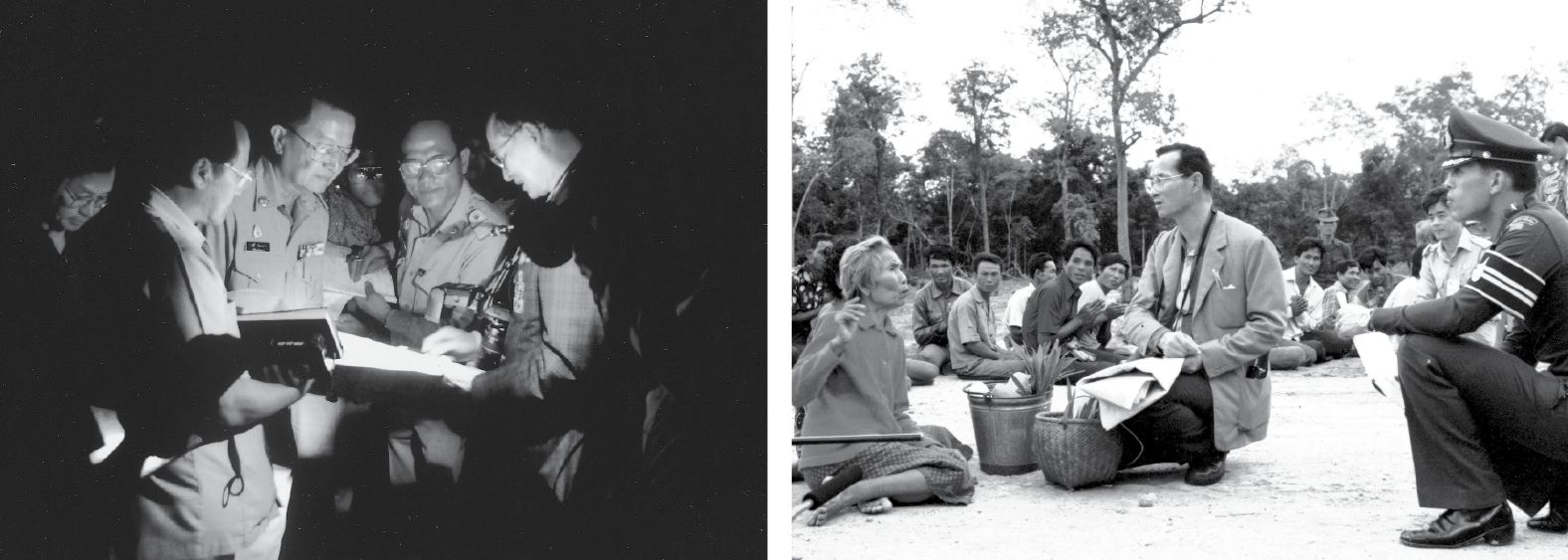
 RSS Feed
RSS Feed
















